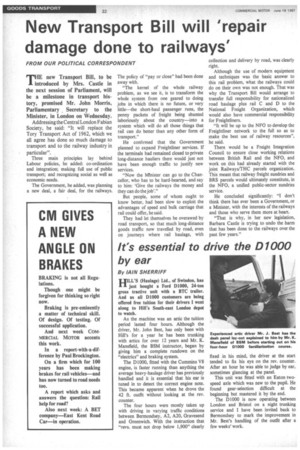New Transport Bill will 'repair damage done to railways'
Page 34

If you've noticed an error in this article please click here to report it so we can fix it.
FROM OUR POLITICAL CORRESPONDENT
THE new Transport Bill, to be introduced by Mrs. Castle in the next session of Parliament, will be a milestone in transport history, promised Mr. John Morris, Parliamentary Secretary to the Minister, in London on Wednesday.
Addressing the Central London Fabian Society, he said: "It will replace the Tory Transport Act of 1962, which we all agree has done so much damage to transport and to the railway industry in particular".
Three main principles lay behind Labour policies, he added: co-ordination and integration; making full use of public transport; and recognizing social as well as economic needs.
The Government, he added, was planning a new deal, a fair deal, for the railways. The policy of "pay or close" had been done away with.
"The kernel of the whole railway problem, as we see it, is to transform the whole system from one geared to doing jobs in which there is no future, or very little—the short-haul passenger runs, the penny packets of freight being shunted laboriously about the country—into a system which will do all those things that rail can do better than any other form of transport."
He confirmed that the Government planned to expand Freightliner services. If the terminals had remained closed to private long-distance hauliers there would just not have been enough traffic to justify new services.
"Now the Mtnister can go to the Chancellor, who has to be hard-hearted, and say to him: 'Give the railways the money and they can do the job'."
But people, some of whom ought to know better, had been slow to exploit the advantages of speed and bulk carriage that rail could offer, he said.
They had let themselves be overawed by road transport, so that much long-distance goods traffic now travelled by road, even on journeys where rail haulage, with collection and delivery by road, was clearly right.
Although the use of modern equipment and techniques was the basic answer to this rail problem, what the railways could do on their own was not enough. That was why the Transport Bill would arrange to transfer full responsibility for nationalized road haulage plus rail C and D to the National Freight Organization, which would also have commercial responsibility for Freightliners.
"It will be up to the NFO to develop the Freightliner network to the full so as to make the best use of railway resources", he said.
There would be a Freight Integration Council to ensure close working relations between British Rail and the NFO, and work on this had already started with the joint Railways/THC parcels organization. This meant that railway freight sundries and BRS parcels would ultimately constitute, in the NFO, a unified public-sector sundries service.
He concluded significantly: "I don't think there has ever been a Government, or a Minister, with the interests of the railways and those who serve them more at heart.
"That is why, in her new legislation, Barbara Castle is trying to undo the harm that has been done to the railways over the past few years."




































































































































